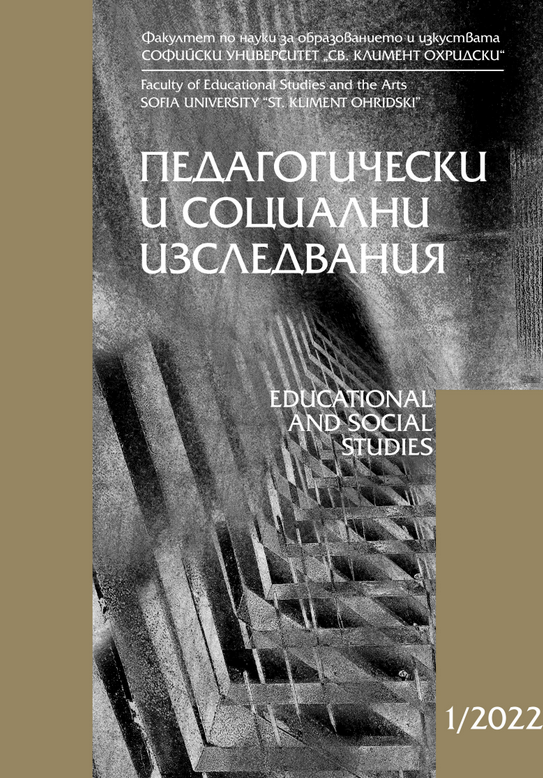Attitudes of students in educational studies towards the risks and benefits of the web and perceived social norms
Keywords:
environment, social norms, ideal body, critical thinking, misinformationAbstract
This article presents the results of a qualitative study conducted with 134 humanities graduate students aged 25-50. The main research questions are: what are the users' attitudes and evaluation of how they use the Web, to what extent and in what direction are the benefits and risks considered in this regard, and what are the perceived social norms and messages in virtual environment. The results reflect a prevalence of perceived positives versus negatives, as well as respondents declaration on the different ways and skills of users to search and rely on information in the web. In regard to notions of the ideal body, the successful person and the modern man, social norms have their place, however it is parallel to the maintained personal opinion. All this is analyzed with reference to the importance of building and maintaining an active attitude of reflection and self-reflection and critical thinking from as early an age as possible.
References:
Bakalova, D., Bakracheva, M. & Mizova, B. (2015). Happiness and life satisfaction: In search of the way to yourself, Sofia: Colbic.
Bakalova, D., Mizova, B. & Bakracheva, M. (2009). Self-presentation and self-image management on social networking sites. In: Proceedings „Applied Psychology in Bulgaria: Opportunities and Perspectives“, Varna, ISSN 1314-0507, 180-191.
Bakracheva, M. & Bakalova, D. (2010). Virtual identity and identity style of the Internet user. Psychological Research, 2, 161-168.
Bakracheva, M. & Bakalova, D. (2011). A theoretical framework for the study of virtual identity as a component of the psychosocial identity of the e-consumer. Bulgarian Journal of Psychology, 1-2, 63-82.
Bakracheva, M., Bakalova, D. & Mizova, B. (2014). Effect of comparisons in virtual and real environment on happiness and life satisfaction. Bulgarian Journal of Psychology, 1-3, 254-271.
Bakracheva, M. & Manolov, M. (2019). The many faces of the Self (The self-concept in the contemorary reality), Sofia: Colbis.
Mizova. B. & Bakracheva, M. (2008). Psychological and ethical dimensions of media reality, In: Proceedings Morality in Bulgarian media, Sofia, 199-205.
Ainsworth, S. & Baumeister, R. (2016). A Meta-Analysis of Social Networking Online and Social Capital. Review of General Psychology, 20, 369–391. 10.1037/gpr0000091.
Bakracheva, M. & Manolov, M. (2016). Reality and self-detachment after long time spent on social networking in relation to meaning in life. International Journal Knowledge, Scientific Papers vol. 14.1, 423-428, ISSN 1857-92.
Bakracheva, M. & Totseva, Y. (2017). Contextual and individual factors determining the belief in conspiracy theories in Bulgaria. In: Proceedings from 3rd International Conference on Education, Culture and Identity, The Future of Humanities, Education and Creative Industries, Sarajevo, ISSN 2566-4409, 309-323.
Gambo, Sarah & Apuke, Oberiri. (2017). Benefits of Accessing Health Information on Social Media among Female Students: A Study in a Nigerian Public University. Global Journal Of HUMAN-SOCIAL SCIENCE: A Arts & Humanities – Psychology, 17, 23-29.
Hruska J, Maresova P. (2020). Use of Social Media Platforms among Adults in the United States—Behavior on Social Media. Societies. 2020; 10(1):27. https://doi.org/10.3390/soc10010027
Huang, C. (2021). Correlations of online social network size with well-being and distress: A meta-analysis. Cyberpsychology: Journal of Psychosocial Research on Cyberspace, 15(2), 3. https://doi.org/10.5817/CP2021-2-3
McKenna, K.Y.A. & J.A. Bargh (2000) Plan 9 from Cyberspace: the Implications of the Internet for Personality and Social Psychology, Personality and Social Psychology Review, 4(1), 57-75.
Papademetriou, C.; Anastasiadou, S.; Konteos, G.; Papalexandris, S. (2022) COVID-19 Pandemic: The Impact of the Social Media Technology on Higher Education. Educ. Sci. 2022, 12, 261. https://doi.org/10.3390/educsci12040261.
Suler, J. R. (2002). Identity management in cyberspace. Journal of Applied Psychoanalytic Studies, 4(4), 455–459.
Suler, J. (2004). The online disinhibition effect. CyberPsychology and Behavior, 7, 321-326.
TEACH – Targeting Extremism and Conspiracy Theories. (2022). Retrieved on 27.04.2022 from https://www.idd.uni-hannover.de/en/research/projekte/teach/#c89158.
Turkle, S. (1995) Life on the screen: Identity in the age of the Internet. New York: Simon and Schuster.
Volkmer, I. (2021). Social media and COVID-19. A global study of digital crisis interaction among Gen Z and millennials. Key results of an international study conducted by wunderman thompson, university of melbourne, pollfish and the world health organization. ISBN 978 0 7340 5669 6.
Wright, K. & Hu, B. (2018). A meta-analysis of Social Network Site use and social support. Computers & Education. 127. 10.1016/j.compedu.2018.08.024.
Yang, Q., Liu, J., & Rui, J. (2022). Association between social network sites use and mental illness: A meta-analysis. Cyberpsychology: Journal of Psychosocial Research on Cyberspace, 16(1), 1. https://doi.org/10.5817/CP2022-1-1
Zhao, S., Grasmuck, S., & Martin, J. (2008). Identity construction on Facebook: digital empowerment in anchored relationships. Computers in Human Behavior, 24(5), 1816-1836. http://dx.doi.org/10.1016/j.chb.2008.02.012





